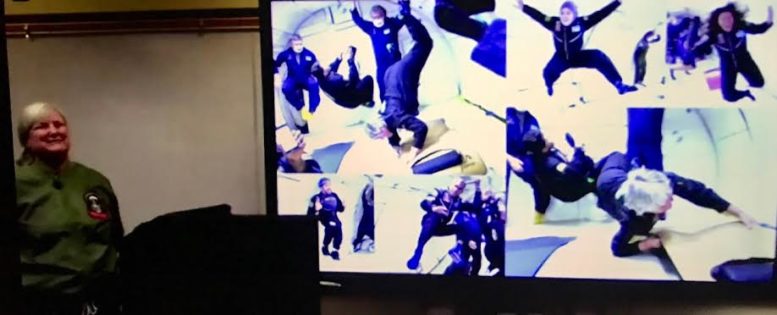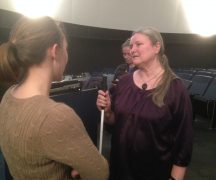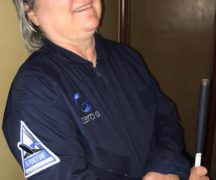By DAVID DUPONT
BG Independent News
Spoiler alert: Sheri Wells-Jensen’s library talk about her adventures in zero-gravity was not an inspirational tale of the linguistic professor following her dreams and breaking barriers.
Her experience as an AstroAccess Ambassador instead re-enforced the notion that people must work together.
That’s what the 12 ambassadors – Wells-Jensen and three other blind people, four deaf people, two wheelchair users, and two lower limb amputees – did when they embarked on a mission to answer questions about the needs of disabled people in zero gravity.
[READ RELATED STORY: Sheri Wells-Jensen embarks on mission to break barriers in space travel]
“The most important thing if you have troubles, if there’s something you need to do, is to be part of a team,” Wells-Jensen said during the Zoom presentation hosted by the Wood County District Public Library. “We can’t do these things ourselves no matter how fiercely or sincerely we might be as an individual. Once on a team we can get to work, not breaking barriers but removing the barriers, which is a better solution.”
That applies not just physical barriers, though that is important, “but also other barriers disabled people have integrating into society.”
She urged people to shop at businesses that are accessible or are owned by disabled people, hire disabled people, consider accessibility in events they organize, and question in their own ableist attitudes.
Wells-Jensen traced human space flight from Yuri Gagarin’s first trip around the earth. That mission ended with him parachuting into a potato field where he reassured the stunned grandmother and child. “Don’t be afraid,” he reportedly told them. “I am a Soviet citizen like you, returned from space, and now I have to find a telephone to call Moscow.”
The United States recruited fighter pilots because that was convenient. They were trained, took orders, and were aware of the dangers of space flight.
They were all White men, not a diverse group, but Wells-Jensen said, she wasn’t going to criticize the decisions made then. They accomplished amazing feats.
But now space exploration is in its infancy. “We’re not ready to go boldly very far right away.”
[READ RELATED STORY: Zero gravity flight was an emotional roller coaster]
“We need different kinds of people,” she said. People who are flexible, who can deal with boredom, isolation, and who are able to live with a few people for a long period of time. They must adapt to bodily changes, such as loss of muscle tone, weakening bones, back aches, and rashes.
They must have the ability to be awake and alert to confront sudden problems.
That’s just what disabled people do every day, Wells-Jensen said.
The playwright and performer Neal Marcus said being disabled is an ingenious way to live. They must be “fiendishly clever,” Wells-Jensen said. They are “people whose problem solving skills are sharpened daily.”
That’s why her vision of the future was the photo of the 12 diverse AstroAccess Ambassadors standing in front of the modified 747 plane on which a wheelchair ramp had just recently been installed at their insistence.
Yet when asked if the mission had changed her outlook, she was less sanguine.
“What is expected in a situation like this is you get a bunch of disabled people together, everybody goes out, you do an audacious thing. And everybody comes back and the disabled people say: ‘Damn, I didn’t know I could do that. I feel better,’” Wells-Jensen said.
“I don’t feel better. I feel worse, and this is why. … I found I didn’t have doubts that I could do this. It was an amazing experience, and I’m overjoyed that I could do it. It did push my limits, and it did make me understand I could do more things than I could imagine.
“But that’s not the feeling I was left with,” she said. “The feeling I was left with was it has widened the gap between the way people see a disabled person and what that disabled person can really do.”
Wells-Jensen continued: “There’s always been a gap in my mind, a frustrating gap that makes me angry and sad, between what people perceive me and my fellow disabled people as being able to do and what we really can do. That gap is difficult to come to terms with.
“The gap is bigger now that it is really clear to me that disabled people can do maybe the most extraordinary job on the planet, be an astronaut, and all we need is the accessibility technology. That gap is bigger, and it makes me sadder because it feels like we have further to go.”



